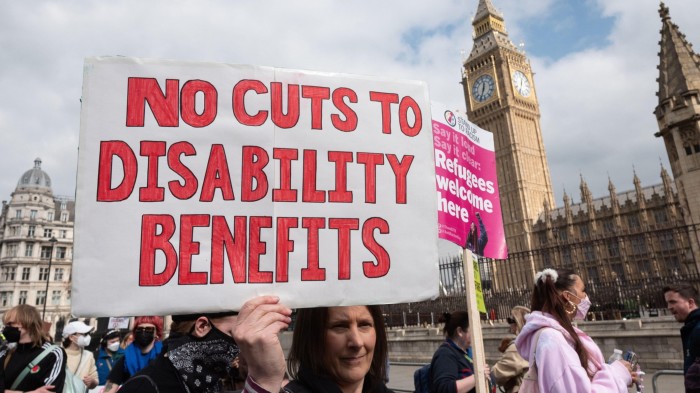Unlock the Editor’s Digest for free
Roula Khalaf, Editor of the FT, selects her favourite stories in this weekly newsletter.
Sir Keir Starmer’s government has made only minor concessions on its controversial welfare bill as he prepares to face what is likely to be the biggest backbench rebellion of his premiership next month.
Labour MPs involved in organising rebels ahead of a crunch vote on the welfare reforms, outlined in parliament on Wednesday, said more than 160 disagree with the proposals, with about 70 currently stating they will oppose the measure in the House of Commons.
One added there were likely to be MPs that resign from their roles as parliamentary private secretaries — unpaid assistants to ministers — when asked to vote on some of the reforms in early July.
The UK prime minister has already announced that he is retreating from his deeply unpopular decision to strip winter fuel payments from about 10mn pensioners, and has signalled he is keen to scrap the two-child benefit cap, which is a significant contributor to child poverty.
Some senior government officials believe these moves have gone far enough to placate some would-be rebels, though many MPs are unconvinced.
“I view those things as completely separate,” said one MP who said he was planning to vote against the bill in its current form, adding: “I remain very, very concerned about what’s on the table and the impact it will have on my constituents.”
There have been recriminations from senior figures in the Labour party over the decision to frame sweeping cuts to the welfare system as part of a cost-saving exercise for the Treasury, with many arguing that it has intensified anger among MPs. Some feel they should have been presented as an effort to fix a poorly functioning system and get more people into work.
Reforms to both disability and incapacity benefits are expected to save the Treasury about £4.8bn, according to government estimates. The reforms will mean that around 800,000 fewer people are eligible for disability benefits, including some who need help washing or showering, and are expected to come into force in November 2026.
In an effort to appease some rebels, the government has said it will offer a 13-week transition period in which people assessed to no longer be eligible for personal independence payments (Pip) will continue to receive support.
About 200,000 people deemed to have the most severe and permanently disabling conditions will also be exempted from having their benefits entitlement reassessed, the government said.
Another rebel MP said it was “irrelevant whether you take money away from people in week one or week 13, I’ll still be voting against”.
The MP added that a whip had approached her this week asking her to abstain, which she declined. “I recognise the need for some reform but this is unacceptable,” she said.
Deputy prime minister Angela Rayner sought to present the proposed reforms as central to a Labour agenda, rather than its antithesis, saying on Wednesday that “Labour is the party of work, fairness and social justice”.
Rayner refused to say whether the whip would be removed from MPs that voted against the government.
Even after the proposed reforms, the overall number of people of working age on disability benefits is expected to rise by 750,000 by the end of this parliament. Spending on this support is expected to rise from £23bn in 2024-25 to £31bn in 2029-30, according to government estimates.





